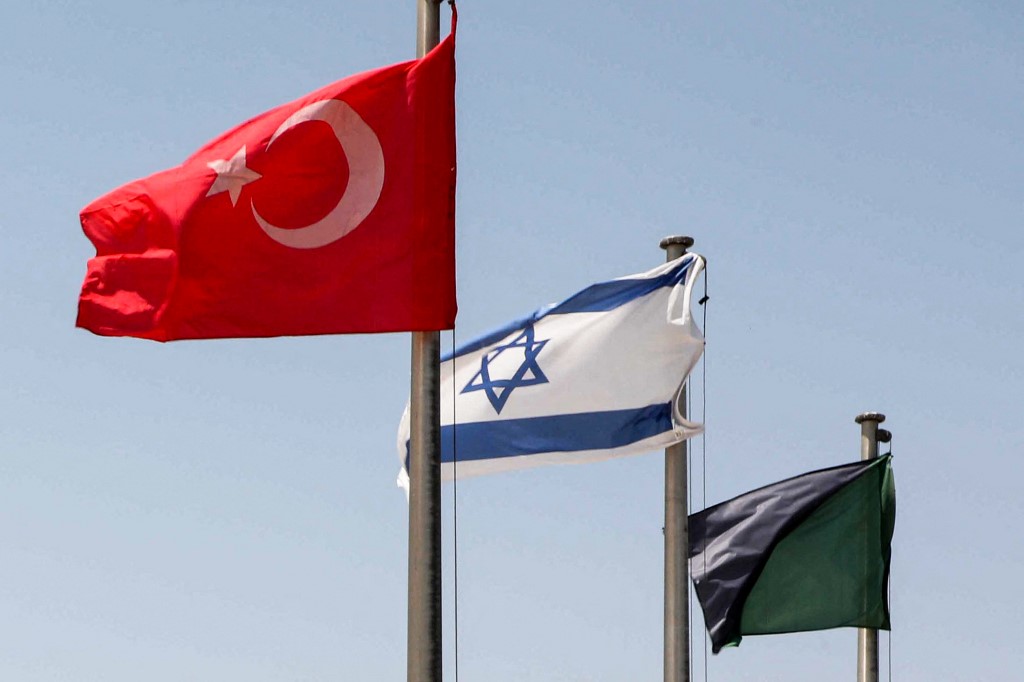Bünyamin Tekin
Analysts warn that Turkey and Israel are on a dangerous trajectory in Syria, where their conflicting strategic visions and expanding military footprints have sharply escalated tensions since the fall of Bashar al-Assad’s regime in December 2024.
Turkey and Israel, two of the region’s most powerful military actors, are increasingly locked in a volatile standoff in Syria. While both countries insist they do not seek a direct war, their expanding roles in the post-Assad power vacuum have put them on what many analysts call a collision course.
The turning point came on December 8, when Assad was overthrown in a lightning offensive by opposition forces led by the Islamist group Hay’at Tahrir al-Sham (HTS). The rebels installed Ahmed al-Sharaa, the former HTS leader, as interim president.
Turkey, which had long supported Syria’s opposition, quickly embraced the new government. President Recep Tayyip Erdoğan praised Assad’s ouster as a “pivotal moment,” opening the way for refugee returns and regional stability. Ankara denied direct involvement in the ouster but admitted to “hope” for the rebels’ victory — despite their designation as a terrorist group by Turkey.
Israel reacted with both relief and concern. While Prime Minister Benjamin Netanyahu welcomed Assad’s fall as a blow to Iranian influence, Israeli forces immediately moved into the UN-monitored buffer zone and expanded their presence in southern Syrian territory.
The Israel Defense Forces (IDF) deployed armored units beyond the 1974 Disengagement Agreement lines, violating the terms of the UN-supervised ceasefire established after the Yom Kippur War. Israeli patrols pushed into Quneitra and Deraa provinces, prompting sharp condemnation from Damascus, Ankara and the United Nations. Israeli officials justified the incursion as a temporary security measure, but analysts and legal experts widely viewed the move as an illegal land grab under the pretext of self-defense.
As 2025 began Turkey focused on consolidating its influence across northern Syria. It reopened border crossings, began rebuilding projects and entered security agreements with the interim government in Damascus. Turkish military advisors were dispatched to retrain Syrian units, and Ankara began negotiating access to strategic facilities like the T-4 airbase in Homs.
Meanwhile, Israel launched a sweeping campaign of airstrikes to cripple Syria’s remaining military infrastructure and prevent the emergence of what it calls a “jihadist front” on its northern border. Dozens of Assad-era weapons sites and airfields were destroyed. Israeli officials openly stated their preference for a divided and weakened Syrian state, fearing that a strong government dominated by HTS veterans and backed by Turkey could pose a long-term threat.

Former Turkish diplomat Mustafa Enes Esen told Turkish Minute that Turkey does not seek to turn Syria into a client state but believes Syria’s survival under a friendly government is essential. “Instability in Syria would inevitably reverberate in Turkish domestic politics,” he said, noting the risk of renewed refugee flows and the growing anti-immigrant backlash in Turkey.
Still, Esen acknowledged that the involvement of HTS complicates matters. “Although al-Sharaa claims they have broken with their past, no one can confidently assume they would not pursue a sectarian agenda or provoke Israel along the border.”
Israel has expanded support for Syrian Druze and minority militias, reportedly encouraging resistance to the new Islamist-led government.
In March Turkey welcomed a landmark agreement between Damascus and the Syrian Democratic Forces (SDF), integrating Kurdish fighters into the national army and restoring Syrian authority over northeast Syria. While this was hailed by Turkish officials as a step toward unity, Israel saw it as a loss: The SDF had been one of the few potential Israeli partners in the post-Assad landscape.

Former Turkish diplomat Haşim Tekineş warned that with Assad gone, “the common enemy disappeared,” and now Turkey and Israel are neighbors in Syria with irreconcilable goals. He described Turkey’s postwar vision as one of economic expansion, security consolidation and long-term influence stretching to Lebanon, Jordan and the Red Sea. Israel, he said, sees this as an effort at encirclement.
In early March sectarian violence in Syria’s coastal region further deepened the divide. Sunni Islamist fighters — some reportedly Turkish-backed — retaliated against Alawite militias linked to the former regime, killing hundreds. Israel seized on the bloodshed to discredit the new order.
Israel’s deputy foreign minister, Sharren Haskel, publicly labeled Syria’s interim leadership a “jihadist regime” and accused it of carrying out “ethnic cleansing” during the deadly sectarian violence in the coastal regions. Haskel claimed the new authorities in Damascus were led by “a jihadist Islamist terror group that took Damascus by force and was supported by Turkey” and said Israel was working to prevent this emerging threat from establishing itself along its northern border.
Ankara condemned the violence but accused Israel of exploiting sectarian divisions to derail Syrian unity.
Against this backdrop, Turkish-Israeli relations plunged to new lows. President Erdoğan’s Eid al-Fitr prayer, where he implored God to “destroy Zionist Israel,” was widely interpreted as a public call for Israel’s elimination.
While Israeli officials denounced Erdoğan’s remarks as incitement, they came at a time when Israel was facing intense global condemnation. The country is currently on trial at the International Court of Justice (ICJ) for genocide in Gaza, following a case brought by South Africa. Amnesty International has concluded that Israel is committing genocide, and Human Rights Watch has found that Israel is committing acts of genocide.
Moreover, in November 2024, the International Criminal Court (ICC) issued arrest warrants for Israeli Prime Minister Benjamin Netanyahu and Defense Minister Yoav Gallant over alleged war crimes and crimes against humanity committed in Gaza.
The international context has made Turkey’s condemnation of Israel far from isolated. Countries across the Global South, and even some in Europe, have denounced Israeli actions in Gaza, southern Lebanon and the West Bank as violations of international law.
In this environment early April 2025 marked the sharpest escalation yet. On April 2, Israeli warplanes conducted multiple strikes across Syria, hitting the T-4 base, Hama military airfield and a research facility near Damascus. Syrian media reported dozens of casualties.
Israel’s defense minister declared the strikes were a “clear message” to Syria and Turkey: Israel would not allow Syria to become a forward base for hostile forces. Foreign Minister Gideon Sa’ar singled out Ankara, accusing it of attempting to “turn Syria into a Turkish protectorate.”
Turkey responded with strong objections following the Israeli strikes. The Turkish Foreign Ministry condemned the attacks as an “unjustified escalation,” while Foreign Minister Hakan Fidan warned that Israel’s operations could destabilize Syria at a critical time. He emphasized that Israeli actions were undermining the new government’s ability to combat the Islamic State in Iraq and the Levant (ISIL) and restore security in the region. However, in a sign of de-escalation, Fidan also stated that Turkey does not seek confrontation with Israel in Syria, adding, “Syrian security should be decided by the Syrians. If they want to have certain understandings with the Israelis, it’s their business.”
Behind the scenes, both countries have quietly initiated negotiations to establish a deconfliction line in Syria, according to Western diplomatic sources. The talks followed Israel’s strikes on the T4 airbase. Netanyahu reportedly told counterparts that Israel had only a limited window to strike the site before Turkish forces arrived, after which it would become off-limits to Israeli operations.
Although tensions remain high, both governments appear eager to avoid direct clashes. On the same day, Turkish and Israeli officials issued near-identical public statements affirming they do not seek conflict.
However, analysts say the situation remains dangerously unstable.
“Both sides fear losing what they’ve gained,” Tekineş said. “And that’s when countries take the biggest risks — not to gain something, but to avoid losing it.”
US President Donald Trump has positioned himself as a potential mediator between Turkey and Israel amid rising tensions in Syria.
Speaking alongside Israeli Prime Minister Netanyahu at the White House on Monday, Trump touted his “very, very good relationship” with Turkish President Erdoğan and claimed he could “work out” the dispute.
Netanyahu welcomed Trump’s mediation, calling him “the best interlocutor” for avoiding direct conflict.
“I frankly think Trump’s statement is a very bad statement. An explanation that will make the situation even more dire,” Tekineş said, underlining that for the US to help de-escalate, it needs to make Washington’s position clear to restrain both sides and not provoke misinterpretations of green lights for the parties’ respective goals.
As of today the situation remains volatile. NATO member Turkey and its one-time strategic partner Israel are on opposing sides of a fragile and fractured battlefield. For now, the guns have not been fired directly between the two states. But the margin for a misstep is narrowing fast.


